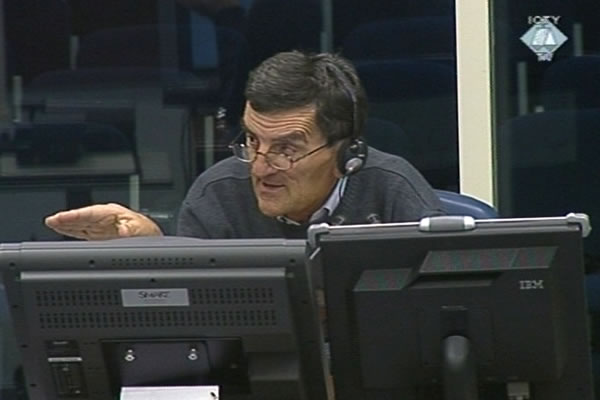Home
WHITEWASHING KERATERM PRISON CAMP
At the trial of two former chiefs of the Bosnian Serb police, Milos Jankovic, former chief of the Prijedor police Communications Center described how the Keraterm prison camp was ‘whitewashed’ for the visit of the International Red Cross staff. As a consequence, everybody looked ‘a bit better than usual’
 Milos Jankovic, defence witness of Stojan Zupljanin
Milos Jankovic, defence witness of Stojan Zupljanin Milos Jankovic, former chief of the Prijedor police Communications and Encryption Center, completed his evidence today after a whole week in the witness box as Stojan Zupljanin’s defense witness. Zupljanin, former chief of the Banja Luka police, is charged together with Mico Stanisic with crimes against Croats and Muslims in 20 BH municipalities in 1992.
In the cross-examination, Jankovic confirmed his evidence at Milomir Stakic’s trial, where he said that the Prijedor police inspectors interviewed prisoners from the Omarska and Keraterm prison camps. Today the witness added that he did not meet the inspectors during his short visits when he fixed the communications equipment in the prison camp. As the witness recounted, during a visit to the Keraterm prison camp he saw that it had been ‘whitewashed’ because the International Red Cross staff were due to come that day and everybody ‘looked a bit better than usual’. ‘I’m afraid that you would tell me I’m lying if I told you they enjoyed it there, but it didn’t look bad during my visit’, the witness said.
The prosecutor quoted Jankovic’s words at the Stakic trial, when he said that everybody in the police avoided speaking about the massacre in Keraterm when about 150 Muslim detainees were killed in ‘Room No. 3’ in the night of 24 July 1992. Jankovic described in vivid detail how everybody in the police ‘turned their backs’ when this topic was broached, and they’d put their finger to their lips saying ‘shh, be quiet, don’t speak about it’. The witness said that ‘it never occurred’ to him to ask about the details of the massacre because he thought it could lead to his death, the witness explained.
The witness again tried hard to see and learn as little as possible when he visited the Omarska prison camp to set up communications system. On that occasion, Jankovic had to wait in the car in front of the prison camp until the buses bringing in prisoners passed by. Today the witness didn’t want to speculate about the number of buses and prisoners arriving as he had not had ‘any motivation’ to count them at the time. At one point, a prisoner tried to flee and ‘there was so much gunfire that the earth and sky were on fire’. This prompted the witness to ‘remain still’ in his car and not look at what was happening outside.
The prosecutor then brought up some telegrams in which Simo Drljaca, Prijedor police chief, asked for various permissions and reported to Zupljanin about the activities in Prijedor, in a bid to contest the defense case that Drljaca acted independently of Zupljanin. The witness said that Drljaca only communicated with Zupljanin when he wanted to ‘shift the responsibility’ on someone else or to get what he wanted. Once he achieved that goal, Drljaca went on doing ‘as he pleased’ and failed to keep his superiors informed when it didn’t suit his purpose, the witness explained.
The witness commented on the telegrams in which Zupljanin allowed Drljaca to continue using 300 police officers to secure the Omarska, Keraterm and Trnopolje prison camps. According to the witness, the numbers seem to be inflated several times over; this in fact reminded him of the old World War II Yugoslav movies where ‘every old woman took part in defeating the abhorrent enemy’. The witness added he didn’t put any trust in Drljaca’s reports about the secret arming of the Serbs and the preparations to set up a Serb MUP in early 1992.
Linked Reports
- Case : Zupljanin i Stanisic - "Bosnia and Herzegovina"
- 2011-10-07 COLOR OF PAPER AS PROOF OF ‘MUSLIM DOMINATION’
- 2011-09-21 WERE BANJA LUKA SPECIALS UNDER STOJAN ZUPLJANIN?
- 2011-09-19 HOW TO DISQUALIFY EXPERTS
- 2011-10-17 ZUPLJANIN’S REACTION TO OMARSKA AND KERATERM
- 2012-03-01 ARMY WAS RESPONSIBLE FOR KINDERGARTEN AND POLICE
- 2012-03-02 LIMITED RESPONSIBILITY OF THE ARMY
